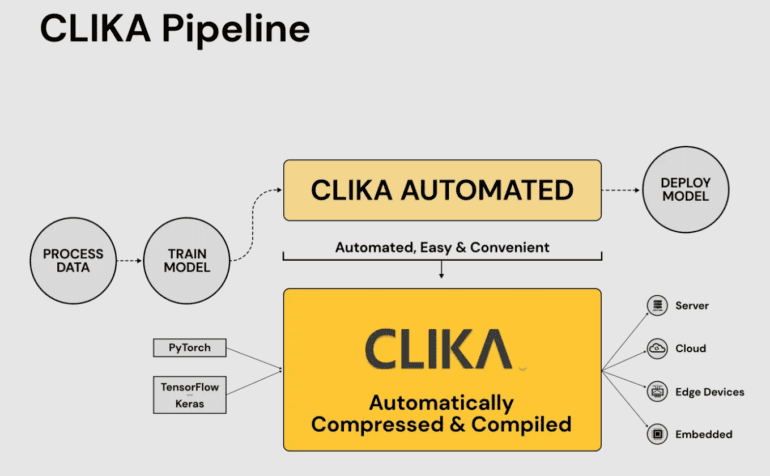TL;DR:
- Clika, founded by Ben Asaf and Nayul Kim, aims to streamline AI model deployment.
- The company’s toolkit reduces compute power usage and speeds up inferencing.
- Clika employs quantization and AI-driven methods for efficient model compression.
- It outshines competitors with its tailored compression approach.
- Clika secures $1.1 million in pre-seed funding, backed by notable investors.
- The company’s impact on the AI market is significant and poised for growth.
Main AI News:
In the fast-paced realm of artificial intelligence (AI), where innovation is measured in microseconds and computing power is paramount, Clika emerges as a transformative force. Founded by Ben Asaf, a seasoned expert in MLOps (machine learning operations), and Nayul Kim, a digital transformation consultant, Clika is on a mission to revolutionize AI model deployment and inference efficiency.
Asaf, known for his prior contributions to Mobileye, the autonomous driving pioneer acquired by Intel in 2017, recognized a critical need in the AI landscape. He observed a scarcity of industrial expertise in implementing MLOps seamlessly into AI development pipelines. Inspired by this gap, Asaf set out to make AI more accessible, agile, and cost-effective for businesses.
Clika, established in 2021, emerged from this vision and quickly made its mark by participating in the prestigious Startup Battlefield 200 competition at TechCrunch Disrupt. The company offers a comprehensive toolkit designed to “downsize” internally developed AI models. This downsizing not only reduces compute power consumption but also enhances inferencing speed—a double-win for AI-driven enterprises.
With Clika, the process is elegantly simple. Users connect their pre-trained AI models, and Clika performs an “auto-magical” compression, rendering the model fully compatible with target devices, be it a server, the cloud, the edge, or embedded systems. The key to this transformation lies in techniques such as quantization, which optimizes data representation by reducing the number of bits required, without compromising the model’s core functionality.
Moreover, Clika doesn’t stop at compression; it provides users with detailed reports outlining potential improvements and optimizations for superior model performance. In an industry grappling with supply chain challenges related to AI hardware, Clika’s approach is both timely and impactful.
While Clika faces competition from other startups like Deci, OctoML, and CoCoPie, Asaf asserts that Clika stands out through its AI-centric approach to compression. Unlike rule-based techniques employed by others, Clika’s compression engine understands diverse AI model structures and applies the most effective compression method tailored to each unique model. Asaf boldly claims that Clika possesses “the world’s best compression toolkit for vision AI,” surpassing the capabilities of industry giants like Meta and Nvidia.
Clika’s prowess has attracted significant investment, raising $1.1 million in a pre-seed funding round, with support from Kimsiga Lab, Dodam Ventures, D-Camp, and angel investor Lee Sanghee. While the company is currently in a closed beta phase, with plans to secure seed funding in the near future, its vision of a streamlined AI landscape is poised to leave an indelible mark on the industry.
Conclusion:
Clika’s innovative approach to AI model optimization, including tailored compression techniques and a user-friendly toolkit, places it at the forefront of the AI landscape. As the market grapples with hardware shortages and increasing demand for efficient AI solutions, Clika’s vision and recent funding success position it as a transformative force with the potential to shape the future of AI model deployment and inference efficiency.

